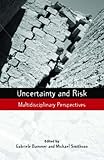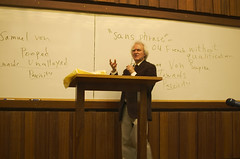Being vexed by Stanley Fish is a mug’s game. But here goes:
Even in courses where the materials are politically and ideologically charged, the questions that arise are academic, not political. A classroom discussion of Herbert Marcuse and Leo Strauss, for example, does not (or at least should not) have the goal of determining whether the socialist or the conservative philosopher is right about how the body politic should be organized. Rather, the (academic) goal would be to describe the positions of the two theorists, compare them, note their place in the history of political thought, trace the influences that produced them and chart their own influence on subsequent thinkers in the tradition. And a discussion of this kind could be led and guided by an instructor of any political persuasion whatsoever, and it would make no difference given that the point of the exercise was not to decide a political question but to analyze it.
So you are allowed to describe positions and arguments but not to venture evaluation. You may not test ideas, theories, positions for validity or intellectual merit. In political philosophy, to argue for or against a political philosophy would be ‘un-academic’. Justification and academia are twain and never the two shall meet. So far as politics go. So most of those we think of as academic political philosophers – Marcuse, Strauss, Rawls, the list is really quite long – aren’t ‘academic’. Because they attempt to justify their own views about how the body politics should be organized. Which disqualifies them. Fine. Whatever.
I really wasn’t going to rise to the bait but the man has a follow up, which concludes:
The demand for justification, as I have said in other places, always come from those outside the enterprise. Those inside the enterprise should resist it, because to justify something is to diminish it by implying that its value lies elsewhere. If the question What justifies what you do? won’t go away, the best answer to give is “nothing.”
Now, to be fair, Fish is talking specifically about justification of the liberal arts here. There is something to be said for the liberal arts as a good ‘in itself’. But Fish feels free to formulate his defense so expansively because he has gotten too comfy with a position that is a silly sort of know-nothingism – justify-nothingism, rather. Being an academic means never having to say you’re sorry for not having reasons. Fish presents this as gracious abstention from public debates academics should not meddle in. That would be bad enough, in my book. What makes it worse is that I suspect Fish thinks the flip-side of this is academic immunity from public criticism. This gets into my reading of his other writings, which I won’t go into right now. What academic ‘interpretive communities’ do is perfectly hermetic and externally unaccountable. I don’t see how that can be right, on the most generous liberal arts education as end in itself view.
Am I unfair to the man?
UPDATE: Julian Sanchez responds thoughtfully to my post. He objects that I am too uncharitable. I think it’s fair to be rather hard-nosed in this case, but your mileage may vary. I like this bit. “On this model [Fish’s], teaching philosophy would look a little like teaching theological interpretation to atheists.” I think that is very apt. I think that in some ways Fish is to intellectual justification as atheists are to God. He just doesn’t believe in the stuff. Or rather, he believes that the things we call ‘justifications’ are all, in some deep, anti-foundational sense, just arbitrary moves in language-games. This drives him to say some odd stuff, per the title of the post.

